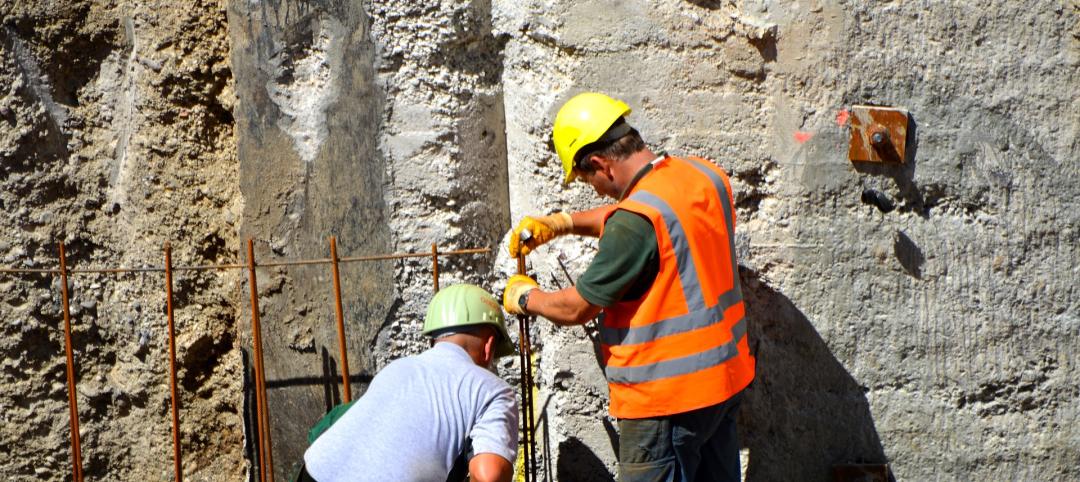To the unndoctrinated, the construction industry conjures images of hard hats and ditch digging. In my years of experience speaking with teachers, students, and up-and-coming generations of workers, time and time again they are surprised to learn that a career in construction can be so much broader and more fulfilling than the stereotypes associated with the trade.
While the industry has made great strides to move beyond a stereotypical view of careers in construction, there is still work to be done to attract, and more importantly, retain, talented workers. Younger generations aren’t just interested in a job, they are seeking career opportunities. They desire to grow, engage meaningfully in their work, and be passionate about what they’re doing. They also want to have a say and be heard.
Flipping Construction Mentoring on Its Head
There’s a unique opportunity for the construction industry to leverage reverse mentorship to retain workers and prepare them for leadership roles while challenging the thoughts and actions of current leaders to improve the culture and operations now and in the future.
Everyone’s familiar with mentorship, where a more senior-level staffer imparts his or her years of wisdom, experience, and council to a younger colleague. Reverse mentorship recognizes that the younger generation has something to offer, too. The added benefit of reverse mentorship is helping seasoned professionals develop new skills, stay connected with younger generations, and gain future-forward insights for life and business.
Relationships between senior and young professionals can be an eye opener for both parties with some crucial benefits supporting today’s business challenges.
Expanding awareness of operations and opportunities. We’ve all heard the saying ‘you don’t know what you don’t know.’ All too often, there’s an information gap between junior and senior staffers, with the junior staff only getting a limited view of the business or projects and senior staffers not fully understanding the breadth of talent on the bench.
Reverse mentoring relationships help connect the dots between junior staffer’s skills and interests and opportunities that they may not have even realized existed in construction. When they know about the possibilities, they can begin to take control and be purposeful in driving their career toward the achievement of a specific goal.
Taking the time to learn more about what young team members are capable of and have interest in, allows senior leaders to identify areas of interest and tailor learning opportunities accordingly. Exposing junior staffers to more prepares them to tap into, and eventually step into, a host of roles. This can be an important part of succession planning.
Room for Diverse Perspectives. Reverse mentoring creates space for diverse perspectives to be heard. Women are the most underrepresented members of the construction workforce. And attracting more women to the construction industry has been a long-standing struggle. The intimate nature of a mentoring relationship makes it possible to dig a little deeper to draw out fresh perspectives and help minority members of the company feel valued and heard.
Creating new pathways to problem solving. As more diverse workers come into the construction industry, with them comes new and valuable perspectives and ways of thinking. It’s crucial to draw those perspectives out and give them space to grow.
Reverse mentoring exposes senior professionals to fresh thinking about the future. Inevitably, we enter ruts and get stuck. We do what we know and what’s comfortable rather than challenge assumptions. Companies that want to improve will seek input from fresh sources: young, old, male, female. No idea is a bad one. Make every meeting and conference room a safe place to elevate new thinking.
This way of approaching problems has served Compass Datacenters well, resulting in major changes that were hard to implement at the outset but serve customers well in the long run.
Advice for implementing reverse mentorship in construction
Start Small. One of the biggest pieces of advice for mentoring of any kind is to know your limits and don’t overcommit. Each season will have a different set of priorities and time restrictions. Be realistic about your schedule and how much time you have available to dedicate to your new relationship. If you don’t have the capacity to commit to attending evening seminars or professional events, consider an in-person lunch or coffee that aligns with your work schedule.
Find the right match for you. It’s important to connect with someone who shares your professional passions; these could be hard or soft skills. Finding the right match for reverse mentorship is all about growing a relationship with someone you respect and connect with. The best mentorship relationships aren’t necessarily between those within the same segment of the industry either. Learning about other areas helps both parties better understand the bigger picture and how each area is connected.
Be authentic and ready to learn. The most important component of reverse mentorship is the relationship itself. In a recent Breaking Glass podcast (a production of Compass Datacenters), I spoke with a colleague about the importance of building your personal board of directors—a group of professionals you can turn to for advice and counsel. In many ways, reverse mentorship is an opportunity to build your board and get well rounded input from colleagues.
The construction industry benefits from relationships and communication. What makes reverse mentorship truly successful is 1) a willingness to be authentic, 2) the act of sharing why you love what you do, and 3) staying interested in hearing other people’s stories.
As the industry continues to grow, it’s critical to prioritize relationships and continuous learning. The best way to prepare for the future of the construction industry is to build relationships with and learn from the next generation.
ABOUT THE AUTHORS
With more than 30 years of experience in the construction industry, Nancy Novak brings extensive expertise in oversight and responsibility for Profit and Loss. In her current role as Chief Innovation Officer for Compass Datacenters, her focus is cutting edge technology, lean practices, and innovative culture through diversity of thought to add value, improve return on investment, and disrupt the construction industry. Nancy serves on the Board of Directors for Weston Solutions, a global environmental firm. She is heavily involved in organizations that lead the way for technological advancement in the construction industry, and she is an advocate for women’s leadership. Nancy currently serves as the Board of Director Vice Chair on the National Institute of Building Sciences BIM Council, as well as Executive Sponsor for the Digital Divide on the iMasons Advisory Board. She is also the host of the “Breaking Glass” podcast, which features Nancy’s dynamic conversations with prominent women in the technology industry—a forum where these accomplished women offer insights, advice and inspiration that listeners can apply to their own professional lives.
Tiffany English is Senior Director, Architecture for Qualcomm Incorporated. Qualcomm is the world’s leading technology innovator. With Real Estate Assets over 12 Million square feet in 30 countries and 40,000+ employees globally. Qualcomm’s breakthroughs in 5G are making the world more connected while making an impact on society and world’s biggest challenges. Tiffany’s role at Qualcomm is oversight of the companies architectural, interior design, space planning, facilities planning, lab planning and MEP engineering teams globally. Tiffany has more than 24 years of industry experience and has overseen, designed, and managed over 7 million square feet of projects for commercial real estate and Fortune 500 clients. Tiffany is currently serving as Immediate Past President of CREW Network, 2021. CREW Network represents 75+ markets and over 12,000 members globally. CREW Network continues to transform the commercial real estate industry by advancing women globally.
Related Stories
Engineers | Sep 15, 2023
NIST investigation of Champlain Towers South collapse indicates no sinkhole
Investigators from the National Institute of Standards and Technology (NIST) say they have found no evidence of underground voids on the site of the Champlain Towers South collapse, according to a new NIST report. The team of investigators have studied the site’s subsurface conditions to determine if sinkholes or excessive settling of the pile foundations might have caused the collapse.
Office Buildings | Sep 14, 2023
New York office revamp by Kohn Pedersen Fox features new façade raising occupant comfort, reducing energy use
The modernization of a mid-century Midtown Manhattan office tower features a new façade intended to improve occupant comfort and reduce energy consumption. The building, at 666 Fifth Avenue, was originally designed by Carson & Lundin. First opened in November 1957 when it was considered cutting-edge, the original façade of the 500-foot-tall modernist skyscraper was highly inefficient by today’s energy efficiency standards.
Healthcare Facilities | Sep 13, 2023
Florida’s first freestanding academic medical behavioral health hospital breaks ground in Tampa Bay
Construction kicked off recently on TGH Behavioral Health Hospital, Florida’s first freestanding academic medical behavioral health hospital. The joint venture partnership between Tampa General (a 1,040-bed facility) and Lifepoint Behavioral Health will provide a full range of inpatient and outpatient care in specialized units for pediatrics, adolescents, adults, and geriatrics, and fills a glaring medical need in the area.
Giants 400 | Sep 12, 2023
Top 80 Retail Sector Contractors and Construction Management Firms for 2023
Whiting-Turner, ARCO Construction, Swinerton, and PCL top BD+C's ranking of the nation's largest retail building contractors and construction management (CM) firms for 2023, as reported in the 2023 Giants 400 Report. Note: This ranking factors revenue for all retail buildings work, including big box stores, cineplexes, entertainment centers, malls, restaurants, strip centers, and theme parks.
Contractors | Sep 12, 2023
The average U.S. contractor has 9.2 months worth of construction work in the pipeline, as of August 2023
Associated Builders and Contractors' Construction Backlog Indicator declined to 9.2 months in August, down 0.1 month, according to an ABC member survey conducted from Aug. 21 to Sept. 6. The reading is 0.5 months above the August 2022 level.
Resiliency | Sep 11, 2023
FEMA names first communities for targeted assistance on hazards resilience
FEMA recently unveiled the initial designation of 483 census tracts that will be eligible for increased federal support to boost resilience to natural hazards and extreme weather. The action was the result of bipartisan legislation, the Community Disaster Resilience Zones Act of 2022. The law aims to help localities most at risk from the impacts of climate change to build resilience to natural hazards.
Metals | Sep 11, 2023
Best practices guide for air leakage testing for metal building systems released
The Metal Building Manufacturers Association (MBMA) released a new guidebook, Metal Building Systems - Best Practices to Comply with Whole-Building Air Leakage Testing Requirements.
Contractors | Sep 11, 2023
Construction industry skills shortage is contributing to project delays
Relatively few candidates looking for work in the construction industry have the necessary skills to do the job well, according to a survey of construction industry managers by the Associated General Contractors of America (AGC) and Autodesk.
MFPRO+ Research | Sep 11, 2023
Conversions of multifamily dwellings to ‘mansions’ leading to dwindling affordable stock
Small multifamily homes have historically provided inexpensive housing for renters and buyers, but developers have converted many of them in recent decades into larger, single-family units. This has worsened the affordable housing crisis, say researchers.
Engineers | Sep 8, 2023
Secrets of a structural engineer
Walter P Moore's Scott Martin, PE, LEED AP, DBIA, offers tips and takeaways for young—and veteran—structural engineers in the AEC industry.

















